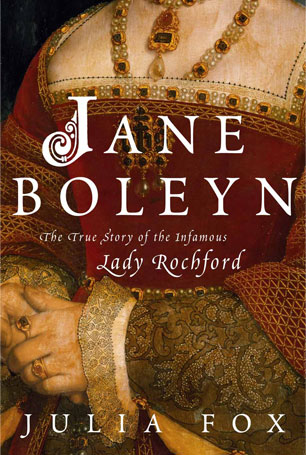
I am deliciously settled into Julia Fox's delectable biography, Jane Boleyn: The True Story of the Infamous Lady Rochford. Have a glass of milk and curl up: it's a bit like reading a novel. i'm unfamiliar with contemporary biographies, and, honestly, this revisionist history reminds me a bit of Lytton Strachey's narratives. Jane was bad, bad, bad: a traitor and a gossip. So we've heard. But Julia Fox has written the case for Jane: she has researched every document or oblique reference to Jane, as is evident from the detailed notes and bibliography My only problem is that she is too quick to admit what she doesn't know . No one seems to have bothered much about Jane except Fox, and it seems that little has been documented. Nonetheless, she has read depositions, biographies, Henry's letters to Anne, wordings and proceedings of the marriage ceremony, manuscripts at the Nathional Archives: this research must have taken years.
Fox frequently uses the subjunctive, however, and this makes me distrust her. There are quite a few "may haves" and "might haves" as Fox struggles to put together the puzzle. The biography would be (subjunctive again) more plausible if she used direct or indirect statements.
Page 246: "We do not know the precise date of Jane's appointment as a lady of the privy chamber but once installed she was likely to come across several of her friends and acquaintances. Her mother's sister, Katherine, recentlyw widowed by the death of Sir Piers Edgecombe, would be there, and so would young Katherine Carey, Mary Stafford's daughter."
There's also a lot of: "Jane may well have been included in one of those ceremonies."
So my question is: how much do we really know about Jane Boleyn? Thus far, the convincing passages center on Anne, about whom so much more is known. Less subjunctive would help here. So perhaps the title should be: The Conflict of Anne and Jane, etc.
I'll keep reading. I'm only halfway through.
No comments:
Post a Comment